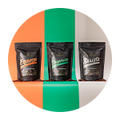Siberian Ginseng has been used in traditional Chinese medicine as far back as 2000 years ago. Siberian ginseng is the catfish of the herb game, it’s not a ‘true’ ginseng variety as it doesn’t contain ‘ginsenoside’ compounds. It’s official name is eleuthero as it is instead a rich source of eleutherosides, an active ingredient that provides an adaptogen effect when consumed.
So what on earth is an adaptogen then?! An adaptogen is a substance used in herbal medicine that has a positive effect on the body by counteracting the signs and symptoms of mental and physical stress. Stress can have a negative impact on your body and can cause damage to the neurological, endocrine, and immune systems if not kept in check.
It can also help boost your energy levels! Eleuthero can act as a stimulant and its compounds have been shown to help reduce exhaustion and lessen the side effects of being fatigued. This stimulatory effect is why you’ll see Ginseng included in a large variety of supplements and energy drinks.
It’s a great option for athletes too! One study looked at supplemented males who trained recreationally with a high dose of eleuthero each day across an 8 week period. Results indicated that the supplementation increased their endurance time by 23% and improved peak oxygen saturation by 12%.
It can help reduce water retention. Eleutherosides in Siberian Ginseng can improve your lymphatic function and support the lymph node network. A study found that fluid swelling significantly decreased within 4 hours of subjects supplementing with the compound.
Eleuthero can help speed up healing time and generally support overall health. The adaptogen and antioxidant benefits of Siberian Ginseng can help speed up healing time, as well reduce the risk of developing ulcers and foot ulcers in diabetics! Although further studies in humans are required, there is initial evidence that Siberian Ginseng can help increase blood pressure to a healthy range for people with hypotension, improve bone density and reduce the risk of osteoporosis.
Initial studies have also shown promising data that the wonder herb could potentially improve heart health, prevent artery disease and decrease blood glucose levels in type 2 diabetic patients.









